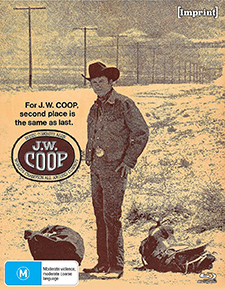J.W. Coop (Blu-ray Review)

Director
Cliff RobertsonRelease Date(s)
1972 (July 11, 2025)Studio(s)
Robertson and Associates/Columbia Pictures (Imprint Films/Via Vision Entertainment)- Film/Program Grade: A-
- Video Grade: A-
- Audio Grade: A
- Extras Grade: F
Review
[Editor's Note: This is a Region-Free Australian Blu-ray import.]
During the late-1950s/early-‘60s, the glory days of American television anthology drama, four actors were in great demand: Richard Kiley, William Shatner, Jack Klugman, and Cliff Robertson. Kiley seemed to specialize playing disillusioned idealists, Shatner as straight-laced young men prone to mental unraveling, Klugman as three-time losers, and Robertson as starry-eyed dreamers. None became big movie stars, though Robertson came closest, first starring as John F. Kennedy in Warner Bros.’s big production of PT 109, and later in the title role of Charly (1968), which earned him an Academy Award as Best Actor. Soon after Robertson parlayed that success into JW Coop (1971), in which he not only starred, but produced, directed, and co-wrote. Made for just $736,000, about the price of a TV-movie then, the independent film received mixed reviews and did scant business. He directed one film after, the little-seen The Pilot (1980), but after that mostly alternated between supporting parts in big movies (Star 80, Brainstorm, Spider-Man) and bigger roles on the small screen.
JW Coop (J.D. Coop on the posters, but JW Coop on the title card, like BJ Hunnicutt) is a modern Western set amid the rodeo circuit, much like Sam Peckinpah’s Junior Bonner, The Honkers, and When Legends Die, all released in 1972, though this may have been made first. JW Coop and Junior Bonner are very good, though none are superior to Stoney Burke, Leslie Stevens’s marvelous 1962-63 TV series starring Jack Lord, a series less about rodeo competition than a portrait of a man of character. Given that Cliff Robertson starred in the pilot episode of Stevens’s immediate follow-up program following Stoney Burke’s cancellation, The Outer Limits, it’s not unreasonable to assume that Robertson saw and was inspired by a few episodes of the Jack Lord series, which this in some ways resembles.
JW Coop opens with its title character (Robertson), a bronc rider, released from prison after serving a nine-year sentence for check fraud, a crime that he might not have (at least intentionally) committed. JW hopes to restart his rodeo career, and after first visiting his haggard, senile mother (Geraldine Page, looking the part but in fact one year younger than Robertson), he begins a long cross-country road trip to reach the circuit.
The film’s best scenes are in its first two-thirds, JW hitchhiking and listening far more than talking about himself. There a number of fine vignettes as he catches rides with a conservative pig farmer played by John Crawford, a truck driver played by Bruno Kirby, dreaming of one day owning a boat. For a time, he drives across the country himself in a beat-up 1949 Hudson, whose leaded exhaust attracts the attention of a motorcycle cop (Son Hooker); their exchange is almost indescribable, like a non-comic version of John Candy and Michael McKeon in Planes, Trains & Automobiles, yet somehow, it’s beguiling.
Eventually JW meets Bean (Cristina Ferrare, soon after the wife of John DeLorean), an environmentally-conscious hippie—she talks of recycling, perhaps the earliest use of that term in an American movie. They become lovers, he earns a lot of dough on the circuit and becomes obsessed with beating odds-on favorite Billy Hawkins (Dennis Reiners), who has the advantage of a private plane, enabling him to compete in several rodeos in a single day.
The cooperation Robertson got from various rodeo circuits allowed for much authentic footage—including a stunt man clearly gored in the eye by a bull—but these scenes are more generic and less interesting than the little slices of life JW encounters along the way, elegiac in ways similar to other films from the period set in the economically downtrodden American West, movies like The Last Picture Show and Mackintosh and T.J. (1975), Roy Rogers’s last film. JW and Bean are more compelling when they’re poor; as TJ’s fortunes rise he grows a Burt Reynolds-like mustache and they stay in pricier hotels, but JW becomes too single-minded and pig-headed—obsessed with winning the national championships—and the movie loses a little of its magic.
Imprint’s Blu-ray of JW Coop is an excellent encoding provided by Sony, the color film in 1.78:1 widescreen, approximating its original 1.85:1 theatrical presentation. The movie was made so cheaply and quickly there are small flaws inherent in the original production: shots with minor negative scratches and speckling, etc., but mostly it looks very good. The LPCM 2.0 mono is also better than acceptable and optional English subtitles are offered on this Region-Free disc. This release is limited to 1,500 copies.
There are, alas, no extra features at all, not even a trailer.
Robertson’s name is all over the credits, but there’s little doubt he earned all that real estate on the titles. He gives a good performance, his direction of the other actors is particularly fine, and the script he co-wrote varies enough from other down-on-his-luck-aging-rodeo-cowboy stories that it remains interesting throughout, though the last 15 minutes aren’t as good as what came before. Still, a little diamond in the rough, and recommended.
- Stuart Galbraith IV

